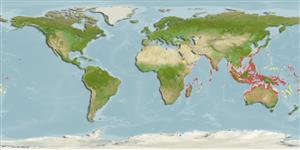Preferred temperature (Ref.
123201): 25 - 29.3, mean 28.4 °C (based on 2783 cells).
Phylogenetic diversity index (Ref.
82804): PD
50 = 0.5000 [Uniqueness, from 0.5 = low to 2.0 = high].
Bayesian length-weight: a=0.01023 (0.00477 - 0.02194), b=3.01 (2.83 - 3.19), in cm total length, based on LWR estimates for this (Sub)family-body shape (Ref.
93245).
Nível Trófico (Ref.
69278): 3.5 ±0.4 se; based on size and trophs of closest relatives
Resiliência (Ref.
120179): Médio, tempo mínimo de duplicação da população 1,4 - 4,4 anos (Preliminary K or Fecundity.).
Fishing Vulnerability (Ref.
59153): Low vulnerability (12 of 100).
Nutrients (Ref.
124155): Calcium = 77.6 [40.0, 153.6] mg/100g; Iron = 0.651 [0.328, 1.160] mg/100g; Protein = 18.7 [16.8, 20.4] %; Omega3 = 0.134 [0.063, 0.235] g/100g; Selenium = 19.3 [10.7, 38.6] μg/100g; VitaminA = 113 [30, 359] μg/100g; Zinc = 1.97 [1.36, 2.86] mg/100g (wet weight);
